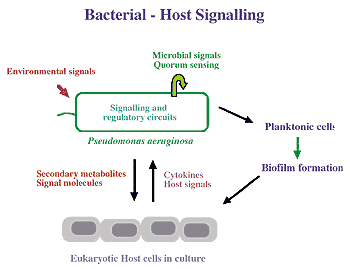| 2003 |

|
YEAR BOOK |
University College Cork
|
Bacterial-host interactions: the fight for survival!
|
Within the BRC, a team of post doctoral and post graduate scientists, in association with a number of national and international collaborators, work together on the core thematic area of microbial-host interactions. This encompasses a number of related research programmes: (i) Functional Genomics of Prokaryotes, (ii) Environmental Biotechnology, and (iii) Biomedical Research. The major focus is on both fundamental and applied issues, such as the chemical nature of microbial and host signals, the signal transduction and genetic regulatory pathways controlling their production, and the molecular and physiological impact of these signals on target organisms. The proposed SFI funded research is aimed at utilising an Integrated Systems Biology approach, in the form of Functional Genomics and Proteomics, to establish how environmentally-regulated bacterial signals and signalling between bacteria and human cells influence gene expression, life-cycle and virulence in the opportunistic pathogen Pseudomonas aeruginosa.

In our research programme, the role of signal molecule production by Pseudomonas species is being studied, with an emphasis on novel genes and pathways that have been identified in the BRC. The importance of signalling between host cells and P. aeruginosa is also being explored. Ultimately, new target areas for the development of novel anti-microbial therapies may be identified.
Contact: Prof. Fergal O'Gara, Director, BIOMERIT Research Centre, Microbiology Department,
National University of Ireland, Cork (UCC);
E-mail: [email protected]